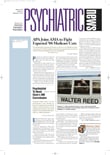Two years ago, following the terrorist attacks of September 11, community surveys indicated significant psychological distress that led some mental health experts to predict widespread increases in the need for mental health services. Indeed, early reports indicated an increase in need for mental health services, resulting in massive efforts—such as the $100 million-plus Project Liberty, funded by the Federal Emergency Management Agency and the Center for Mental Health Services—to provide screening, referral, and counseling services (Psychiatric News, September 6, 2002). Experts predicted that veterans who had pre-existing posttraumatic stress disorder (PTSD) would be especially vulnerable to the traumatic events of that day and the war on terrorism that would follow.
Now, a new study appearing in this month’s American Journal of Psychiatry has determined that those predictions were not fulfilled. The data indicate that the terrorist attacks of September 11 resulted in no significant increase in the use of Veterans Affairs services for the treatment of PTSD or other mental disorders or in visits to psychiatric or nonpsychiatric clinics in New York City, the greater New York metropolitan area, or Washington D.C.
“There have now been a number of studies—of which ours is only one—that have shown that, in fact, the increase in [the use of] mental health services and of medications was far less than previously reported and did not last very long,” said Robert Rosenheck, M.D., director of the Department of Veterans Affairs Northeast Program Evaluation Center (NPEC) in West Haven, Conn., and a professor of psychiatry at Yale University.
Rosenheck and his co-author, Alan Fontana, Ph.D., also at the NPEC and a research scientist in the department of psychiatry at Yale, analyzed national administrative data from the VA’s health care system to compare use of both mental health and general medical services during the six months before and after September 11, 2001. They then compared those usage patterns to data from the same periods surrounding September 11 in 1999 and 2000.
“The main limitation on this study was we were looking at administrative data—we didn’t have any data on symptom reactions,” Rosenheck told Psychiatric News. “We have a subsequent study that does address the symptom picture, and in analyzing those data we actually found that in the period after September 11 [2001] veterans coming into [the VA’s specialized PTSD treatment] programs had lower—slightly lower—symptom levels than veterans in previous years and that, remarkably, they showed more improvement.”
Taken together, Rosenheck said, the data indicate that “there was a great deal of coming together as a nation after September 11. Secondly, there was a good deal of honor paid to veterans—they were given great respect after that, and there was also a widespread recognition that PTSD was a serious problem that people who had been exposed to traumatic conditions could have.”
All of these phenomena, Rosenheck believes, helped to make veterans feel especially supported and validated. As such, they appear to have been less vulnerable, rather than more vulnerable, in spite of their prior experiences.
What people experienced following September 11, 2001, Rosenheck emphasized, “were extraordinary reactions to extraordinary events. What they were not is mental illness.”
What is fascinating, he added, is that in American culture, “if something really awful happens, one of the ways we try to communicate to each other the horror of it is by saying that it causes mental illness.” But there is a great deal of horror in the world that does not lead to mental illness, Rosenheck noted.
“It is important for us as psychiatrists,” Rosenheck commented, “both to identify mental illness when it is underrecognized, but also to identify things that are emotionally upsetting, yet not necessarily mental illness.”
Am J Psychiatry 2003 160 1684
